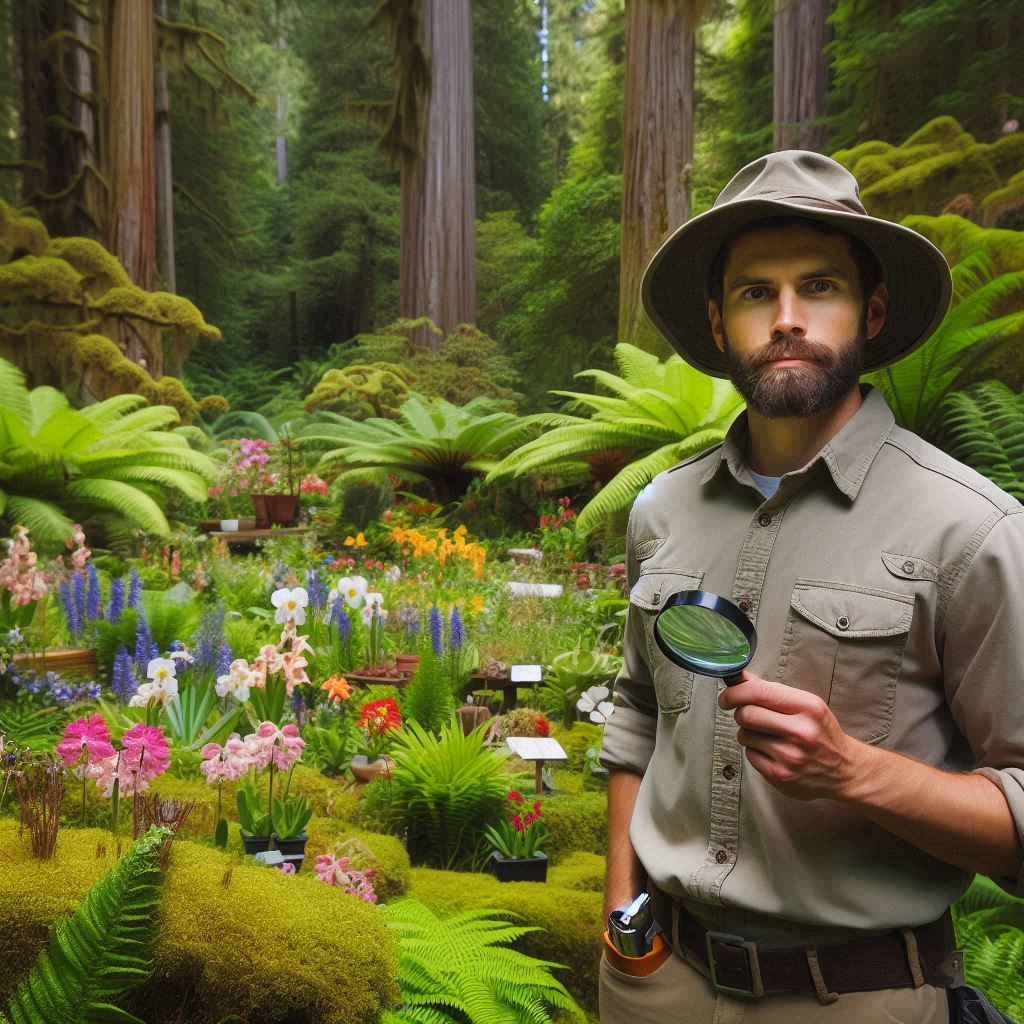Introduction
Botany conferences and workshops play a crucial role in advancing the field of botany in the USA.
These events provide a platform for botanists, researchers, and students to share their latest findings, discuss cutting edge research, and collaborate on innovative projects.
As the importance of botany in addressing global challenges such as climate change and food security continues to grow.
The popularity of such conferences and workshops among the scientific community has increased significantly.
Attending these events allows participants to stay updated on the latest developments in the field.
They can network with fellow professionals and forge new collaborations.
Conferences and workshops serve as a hub for knowledge sharing, enabling attendees to gain valuable insights from experts in various subfields of botany.
The exchange of ideas and experiences that takes place at these events helps to foster a culture of innovation and scientific excellence within the botany community.
These gatherings promote collaboration and encourage interdisciplinary research.
They foster partnerships among academia, industry, and government agencies.
Overview of Botany Conferences in the USA
Botany conferences in the USA provide essential platforms for scientists, researchers, and enthusiasts.
They foster networking, collaboration, and knowledge sharing.
Many conferences occur annually or biennially across the country.
Here’s a list of popular botany conferences:
Popular Botany Conferences
Botanical Society of America (BSA) Annual Meeting
- Organized by the Botanical Society of America.
- Focuses on various botanical disciplines, including research presentations and workshops.
American Society of Plant Biologists (ASPB) Annual Meeting
- Sponsored by the American Society of Plant Biologists.
- Covers plant physiology, development, and molecular biology.
Ecological Society of America (ESA) Annual Meeting
- Organized by the Ecological Society of America.
- Emphasizes ecology and its intersections with botany and environmental science.
Society for Economic Botany Annual Meeting
- Focuses on the relationship between plants and people.
- Discusses topics like traditional medicine and sustainable practices.
International Association of Botanical Gardens (IABG) Conference
- Connects botanical garden professionals.
- Discusses conservation, education, and plant collections.
American Fern Society (AFS) Annual Meeting
- Organized by the American Fern Society.
- Focuses on the study and conservation of ferns.
Key Organizers and Sponsors
Various organizations, universities, and institutions sponsor these conferences.
They include:
- Botanical Society of America
- American Society of Plant Biologists
- Ecological Society of America
- Society for Economic Botany
- American Fern Society
These organizations work collaboratively with academic institutions and environmental groups.
They provide resources and expertise to enhance conference quality.
Topics Covered
Botany conferences cover a diverse range of topics.
They aim to address contemporary challenges and advancements in botanical science.
Some common themes include:
- Plant Physiology: Exploring plant functions and processes.
- Ecology: Understanding plant-environment interactions.
- Taxonomy: Studying plant classification and identification.
- Conservation: Focusing on plant conservation strategies and biodiversity.
- Ethnobotany: Examining the relationship between plants and human cultures.
- Plant Genetics: Discussing genetic diversity and breeding strategies.
These topics encourage interdisciplinary discussions and innovative solutions.
Participants share research findings, techniques, and best practices.
Workshops and presentations often lead to collaborative projects and initiatives.
Botany conferences in the USA play a vital role in advancing plant science.
They unite experts and enthusiasts to discuss key topics and emerging trends.
Attending these conferences enriches knowledge and fosters connections.
As botany continues to evolve, these conferences will remain crucial for the scientific community.
Structure of Botany Conferences
Botany conferences in the USA use a structured format.
This design maximizes knowledge exchange, collaboration, and networking opportunities for participants.
The typical structure of botany conferences includes a variety of elements that cater to the diverse needs and interests of attendees.
Typical structure includes keynote speeches
Keynote Speeches
Keynote speeches are delivered by distinguished experts in the field of botany.
Offering valuable insights and perspectives on the latest developments and trends in the field.
These speeches set the tone for the conference and provide inspiration to participants.
Plenary Sessions
Plenary sessions bring together all conference participants for in-depth presentations and discussions on key topics in botany.
These sessions allow for the sharing of research findings, best practices, and innovative ideas among peers.
Panel Discussions
Panel discussions feature experts engaging in dialogue on specific themes or topics of interest in botany.
These discussions offer a platform for interactive exchanges and debates, fostering a deeper understanding of complex issues in the field.
Workshops
Workshops provide hands-on training, practical skills development, and interactive learning experiences for participants.
These workshops focus on specialized topics, techniques, and tools relevant to botany research and practice.
Poster Presentations
Poster presentations allow participants to showcase their research findings, projects, and ideas through visual displays.
This format enables networking, feedback, and discussions among attendees and encourages collaboration and knowledge sharing.
Opportunities for Participants
- Present research findings
- Engage in Q&A sessions
- Attend specialized workshops
Botany conferences provide many opportunities for participants to engage with peers.
Attendees can share their research findings.
They can also enhance their knowledge and skills in the field.
Presenting research findings allows participants to receive feedback, insights, and suggestions from colleagues and experts.
Q&A sessions provide a platform for participants to engage in dynamic discussions, seek clarification on complex topics, and explore new perspectives and ideas.
These sessions promote intellectual exchange, critical thinking, and collaborative problem-solving among attendees.
Specialized workshops focus on specific themes, methodologies, and technologies relevant to botany research and practice.
These workshops offer practical training, hands-on experience, and valuable insights from experts, enhancing participants’ skills, knowledge, and expertise in the field.
Importance of Networking Events
Networking events play a crucial role in connecting participants, facilitating collaborations, and fostering professional relationships in the field of botany.
These events provide opportunities for participants to interact, exchange contact information, and explore potential collaborations and partnerships.
Social Gatherings
Social gatherings create a relaxed and informal setting for participants to socialize, build friendships, and strengthen professional connections.
These gatherings foster a sense of community, camaraderie, and mutual support among attendees, enhancing the overall conference experience.
Field Trips
Field trips allow participants to explore botanical gardens, research facilities, and natural habitats.
They provide hands-on learning experiences and encourage observation and exploration.
These trips enhance participants’ understanding of botany, ecology, and the natural world, enriching their knowledge and appreciation for plants and ecosystems.
Botany conferences in the USA offer a dynamic and interactive platform.
Researchers, practitioners, and students actively engage in knowledge exchange.
They collaborate and network to share ideas and insights.
These conferences provide diverse opportunities for participants.
They can present their research findings and interact with peers.
Participants can also enhance their skills and expertise in botany.
Read: Earning Potential: Chemist Salaries Across US States
Benefits of Attending Botany Conferences
Stay Updated on the Latest Research Trends, Methodologies, and Technologies
Attending botany conferences is a crucial way for researchers to stay updated on the most recent developments in their field.
These conferences serve as platforms where experts, scholars, and practitioners present cutting-edge research findings and technological advancements.
By attending, researchers gain insights into the latest plant study methodologies and newly developed botanical tools and technologies.
Botany is a field that constantly evolves, with new discoveries being made regularly.
Conferences offer researchers the chance to learn about these developments firsthand.
These events offer innovative techniques for studying plant genetics, enhancing attendees’ research.
They also introduce groundbreaking conservation methods.
Attendees gain access to advanced ecological monitoring tools, significantly improving their research projects.
Attending a conference exposes researchers to new ideas, experimental designs, and analytical methods.
They can then incorporate these advancements into their work.
Additionally, staying up-to-date with trends in the field is essential for maintaining competitiveness in the world of research.
Knowledge of the latest developments allows researchers to position themselves at the forefront of the field.
This not only enhances their own scientific contributions but also positions them as thought leaders in their area of expertise.
Staying updated with trends improves research quality and relevance to current scientific discussions.
This increases chances of publication in high-impact journals.
Interact with Renowned Botanists, Researchers, and Industry Professionals
One of the most significant advantages of attending botany conferences is the opportunity to interact with leading experts in the field.
Conferences attract a diverse range of participants, including renowned botanists, early-career researchers, and professionals from related industries.
This mix of experience and perspectives creates a fertile ground for networking and establishing meaningful connections.
For researchers, networking is an invaluable part of career development.
By engaging in discussions with leading experts, participants can gain insights that are not easily accessible through other means.
These interactions often lead to mentorship opportunities, where established researchers provide guidance and advice to those at earlier stages in their careers.
Moreover, networking at conferences can open doors to collaborative opportunities that can enrich a researcher’s work.
Building relationships with other botanists and professionals in related fields can lead to research partnerships that may not have been possible otherwise.
These collaborations can take many forms, from co-authoring papers to working together on large-scale research projects.
Botany conferences offer industry professionals a platform to share valuable insights with researchers.
These professionals provide practical perspectives for researchers interested in real-world applications.
Interacting with professionals in agriculture, pharmaceuticals, or biotechnology helps researchers apply scientific discoveries in real-world situations.
Transform Your Career Today
Unlock a personalized career strategy that drives real results. Get tailored advice and a roadmap designed just for you.
Start NowPresent Research Findings, Receive Constructive Feedback, and Explore Collaborations
Botany conferences offer researchers an invaluable opportunity to present their own research findings to an engaged and knowledgeable audience.
Presenting at a conference allows researchers to share their work, whether it’s in the form of a lecture, poster presentation, or interactive workshop.
Increasing visibility is crucial for raising awareness of your research within the scientific community.
It boosts your chances of recognition and citations from others in the field.
One of the most valuable aspects of presenting at a conference is the feedback researchers receive from their peers.
Conference audiences are often composed of specialists in the same field or closely related disciplines, providing an excellent environment for constructive criticism.
This feedback can be instrumental in improving the quality of ongoing or future research projects.
Suggestions or alternative perspectives from colleagues help researchers refine methodologies, clarify arguments, and explore new directions.
Furthermore, presenting research at conferences enhances a researcher’s profile within the broader scientific community.
Increasing visibility leads to greater recognition for their work.
This recognition can result in invitations to speak at future events.
They may also be invited to serve on advisory boards. Additionally, they can contribute to important publications.
This professional recognition boosts a researcher’s career prospects.
It also advances the field by disseminating high-quality research to a wider audience.
Learn from Case Studies and Real-World Applications
Many botany conferences feature presentations that focus on real-world applications of botanical research.
These case studies offer valuable insights into how scientific research tackles practical challenges.
They focus on crop resilience, conservation efforts, and environmental sustainability.
Researchers can learn from these examples how to apply their theoretical work to solve pressing global issues.
This knowledge not only broadens a researcher’s perspective but also enhances the societal relevance of their work.
Understanding the practical implications of research can lead scientists to adjust their focus or approach in ways that maximize the real-world impact of their findings.
This can be especially important for researchers seeking funding, as grant agencies often prioritize research that has clear applications for societal benefit.
Attending botany conferences offers numerous benefits for researchers.
The platform keeps you updated on the latest trends.
You can network with leading experts and present your research findings.
Receive feedback and explore collaborative opportunities.
Additionally, it allows researchers to learn from case studies that demonstrate the real-world applications of their work.
Participating in these events helps researchers enhance their knowledge.
They can also expand their professional networks. Additionally, they contribute more effectively to advancing botany.
Read: Top Chemistry Departments and Schools in the US

Registration and Participation
Botany conferences and workshops in the USA offer valuable opportunities for networking, learning, and sharing research.
Registering for these events is essential for participation.
Here’s how you can navigate the registration process effectively.
How to Register
- Visit the Conference Website: Start by visiting the official website of the conference or workshop.
Look for the “Registration” section, which usually contains all relevant details. - Complete the Online Form: Fill out the online registration form with accurate information.
Ensure that you provide your contact details and any affiliation. - Pay Registration Fees: Registration fees vary by event, usually ranging from $100 to $500.
Check the specific conference website for exact fees. - Review Deadlines: Note important deadlines for registration.
Early registration often provides discounts and guarantees your spot. - Eligibility Criteria: Check the eligibility criteria, as some events may require specific qualifications or affiliations.
Options for Virtual Attendance
The COVID-19 pandemic has changed how conferences operate.
Many events now offer virtual attendance options.
Here’s what to consider:
- Hybrid Formats: Many conferences provide hybrid formats, allowing in-person and virtual participation.
This option makes it easier to attend. - Virtual Registration: When registering, select the virtual attendance option if available.
This ensures you receive all necessary links and materials. - Access to Recorded Sessions: Virtual attendees often receive access to recorded sessions after the event.
This feature allows you to revisit important topics.
Importance of Early Registration
Registering early offers numerous advantages:
- Secure Your Spot: Popular conferences may reach capacity.
Early registration ensures your place. - Lower Fees: Many conferences offer discounted rates for early registrants.
This can help you save money. - Accommodation Planning: Early registration helps you secure accommodation.
Popular hotels often fill quickly, especially near the event venue.
Travel Arrangements for In-Person Conferences
Planning your travel is crucial for a smooth experience:
- Book Early: Book your flights and accommodation as soon as you register.
Early bookings often provide better rates and availability. - Check Travel Restrictions: Review any travel restrictions related to COVID-19.
Some venues may require proof of vaccination or testing. - Transportation Options: Consider your transportation options to the venue.
Research public transport or parking facilities in advance.
Participating in botany conferences and workshops in the USA requires careful planning and timely registration.
Whether attending in person or virtually, understanding registration processes, deadlines, and travel arrangements enhances your experience.
Start your journey today by exploring upcoming events and registering early!
Read: How to Become a Licensed Chemist in the USA: Steps and Tips
Funding and Scholarships
Participating in botany conferences can be expensive.
However, various funding opportunities, grants, scholarships, and travel bursaries can ease financial burdens.
This section explores available financial assistance options for attending botany conferences in the USA.
Types of Funding Opportunities
- Grants: Grants provide financial support for specific research projects.
These funds often cover travel expenses, registration fees, and accommodation. - Scholarships: Scholarships are awarded based on merit or financial need.
Many universities and organizations offer scholarships to support students and researchers attending conferences. - Travel Bursaries: Travel bursaries help offset travel costs.
These are often available through professional associations and specific conference organizers.
How to Apply for Financial Assistance
Applying for financial assistance involves several steps.
Follow these guidelines to increase your chances of receiving support:
- Research Available Options: Start by identifying relevant funding sources.
Look for grants, scholarships, and bursaries offered by universities, organizations, and professional associations. - Check Eligibility Requirements: Each funding opportunity has specific eligibility criteria.
Ensure you meet these requirements before applying. - Prepare Necessary Documents: Gather required documentation for your application.
- Submit Applications on Time: Be mindful of application deadlines.
Late submissions often result in disqualification.
Organize your application materials well in advance to avoid last-minute issues.
Selection Criteria for Funding
Funding organizations often use specific criteria to evaluate applications.
Understanding these criteria can improve your application success:
- Research Relevance: Applications must align with the organization’s focus.
Highlight how your research contributes to the field of botany. - Impact of Attendance: Discuss how attending the conference will benefit your research and professional development.
Articulate how your participation will contribute to the botany community. - Financial Need: Clearly outline your financial situation.
Justifying your need for support can strengthen your application.
Diversifying Funding Sources
Relying on a single funding source can be risky.
Diversifying your funding sources increases your chances of securing financial assistance.
Consider these options:
- Institutional Support: Check with your institution for funding opportunities.
Many universities have dedicated funds for student travel. - Research Grants: Seek research grants from governmental and non-governmental organizations.
These grants often support broader research initiatives. - Professional Associations: Join professional associations in botany.
These organizations frequently offer funding, scholarships, and networking opportunities.
Several funding options exist for participating in botany conferences in the USA.
By researching, applying strategically, and diversifying funding sources, you can enhance your chances of securing financial assistance.
Read: Biology Ethics: Navigating Complex Issues in the US
Future Trends in Botany Conferences
Botany conferences are evolving to meet the demands of a changing world.
Emerging trends focus on innovative formats, inclusivity, and technological advancements.
Here are some of the key trends shaping the future of botany conferences.
Hybrid Conference Formats
Hybrid formats are becoming increasingly popular.
These formats combine in-person attendance with virtual participation.
They allow more people to engage in conferences, regardless of their location.
Benefits of hybrid formats include:
- Wider Reach: Virtual attendance enables participation from diverse geographical areas.
- Flexible Participation: Attendees can choose how they engage, whether in person or online.
- Cost-Effectiveness: Virtual options reduce travel expenses for many participants.
Emphasis on Diversity, Equity, and Inclusion
The botany community is recognizing the importance of diversity, equity, and inclusion (DEI).
Future conferences will prioritize DEI in several ways:
- Speaker Selection: Organizers will strive to feature speakers from diverse backgrounds.
This promotes a range of perspectives in discussions. - Program Development: Conference programming will include topics that address issues faced by underrepresented groups.
This fosters a more inclusive environment. - Audience Engagement: Interactive sessions and workshops will encourage participation from all attendees.
Organizers will focus on creating welcoming spaces.
Technological Advancements
Technological innovations are revolutionizing how conferences operate.
Attendees can expect advancements such as:
Showcase Your Business Today
Reach thousands of readers actively exploring professional services. Publish your business profile and grow your audience now.
Publish Now- Virtual Reality: Immersive experiences will enhance presentations and workshops.
Attendees can explore botanical environments or view specimens up close. - AI-Enabled Networking Platforms: Artificial intelligence will streamline networking opportunities.
Attendees can connect with peers and experts based on shared interests. - Interactive Digital Poster Sessions: Digital poster sessions will replace traditional formats.
These sessions allow for real-time feedback and engagement from attendees.
Sustainability Initiatives
Sustainability will play a crucial role in future botany conferences.
Organizers will adopt practices that minimize environmental impact.
Key initiatives may include:
- Digital Materials: Reducing printed materials will decrease waste.
Participants will receive conference programs and materials digitally. - Green Venues: Conferences will be held at venues with sustainable practices.
This includes eco-friendly catering and waste reduction efforts. - Carbon Offsetting: Organizers may offer options for carbon offsetting travel.
This promotes responsible travel choices among attendees.
The future of botany conferences is bright and dynamic.
Hybrid formats, a focus on diversity, and technological advancements will enhance attendee experiences.
As these trends unfold, the botany community will become more inclusive, innovative, and sustainable.
This evolution will ensure that the field remains vibrant and relevant in addressing the challenges of our time.
Conclusion
Botany conferences and workshops play a crucial role in fostering collaboration, innovation, and professional development in the field of botany.
These events bring together experts, researchers, and enthusiasts to share knowledge, exchange ideas, and inspire each other.
By actively participating in upcoming conferences, individuals can present their research findings, learn from others, and engage in valuable networking opportunities.
Continuous learning is essential in botany, as new discoveries and advancements shape the field.
By attending conferences and workshops, individuals can stay updated on the latest trends, techniques, and technologies in botany.
Knowledge sharing advances botany in the USA.
It enables researchers to build on each other’s work.
Collaboration on projects fosters innovation.
Together, they develop solutions to pressing challenges.
Botany conferences and workshops are essential for driving progress, sparking creativity, and pushing boundaries in the field of botany.
As such, I encourage all readers to participate in upcoming events, present their research, and take advantage of the networking opportunities available.
Together, we can continue to advance the science of botany and make a meaningful impact in the USA and beyond.
[E-Books for Sale]
The Big Book of 500 High-Paying Jobs in America: Unlock Your Earning Potential
$19.99 • 500 High-Paying Jobs • 330 pages
Explore 500 high-paying jobs in America and learn how to boost your career, earn more, and achieve success!
See All 500 High-Paying Jobs of this E-Book
1001 Professions Without a Degree: High-Paying American Jobs You Can Start Now
$19.99 • 1001 Professions Without a Degree • 174 pages
Discover 1001 high-paying jobs without a degree! Unlock career tips, skills, and success strategies for just $19.99!




